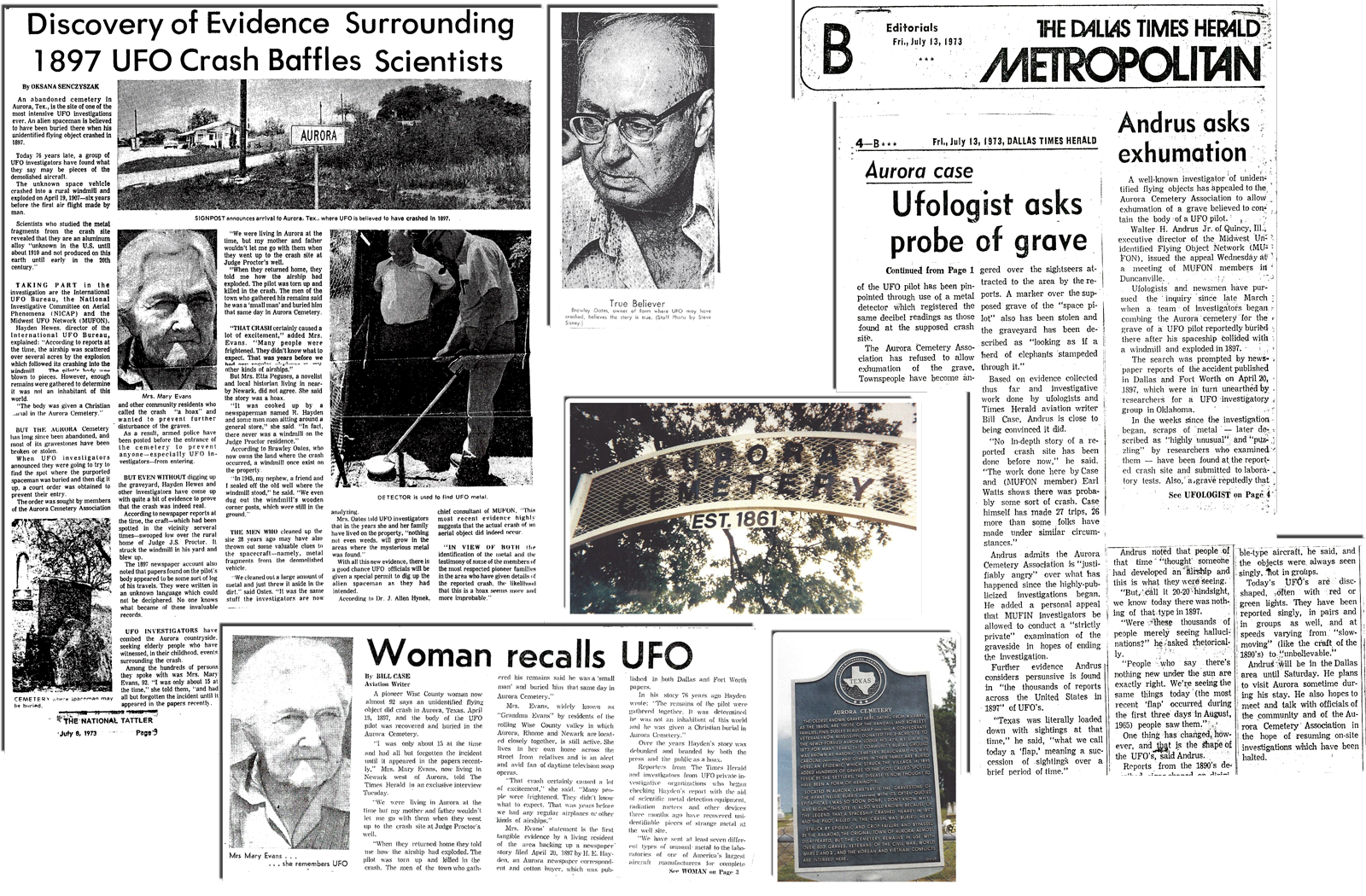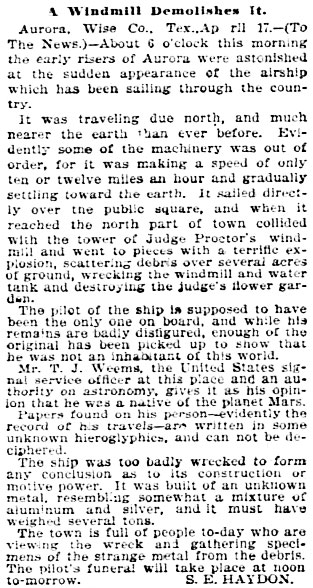The alleged alien body is reportedly buried in an unmarked grave at the local cemetery.
THE INCIDENT (AS REPORTED)
|
During the 1896–1897 timeframe (some six or seven years before the Wright Brothers’ first flight), numerous sightings of a cigar-shaped mystery airship were reported across the United States.
One of these accounts appeared in the April 19, 1897, edition of the Dallas Morning News. Written by Aurora resident S.E. Haydon, the alleged UFO is said to have hit a windmill on the property of a Judge J.S. Proctor two days earlier at around 6am local (Central) time, resulting in its crash. The pilot (who was reported to be “not of this world”, and a “Martian” according to a reported Army officer from nearby Fort Worth) did not survive the crash, and was buried “with Christian rites” at the nearby Aurora Cemetery. (The cemetery contains a Texas Historical Commission marker mentioning the incident.) Reportedly, wreckage from the crash site was dumped into a nearby well located under the damaged windmill, while some ended up with the alien in the grave. Adding to the mystery was the story of Mr. Brawley Oates, who purchased Judge Proctor’s property around 1945. Oates cleaned out the debris from the well in order to use it as a water source, but later developed an extremely severe case of arthritis, which he claimed to be the result of contaminated water from the wreckage dumped into the well. As a result, Oates sealed up the well with a concrete slab and placed an outbuilding atop the slab. (According to writing on the slab, this was done in 1957.) |
HOAX THEORY
- First, the local cotton crop (the major source of town revenue) was destroyed by a boll weevil infestation.
- Second, a fire on the town’s west side claimed several buildings and lives.
- Shortly after the fire, a spotted fever epidemic hit the town, nearly wiping out the remaining citizens and placing the town under quarantine.
- Finally, a planned railroad got within 27 miles of Aurora, but never made it into the town.
Essentially, Aurora (which claimed nearly 3,000 residents at the time) was in serious danger of dying out; Brammer’s research also showed that Haydon was known in the town to be a bit of a jokester, and her conclusion is that Haydon’s article was a last-ditch attempt to keep Aurora alive.
The theory was further supported by the fact that Haydon never performed any sort of follow-up on the story, not even to report on the alien’s burial, which is highly unusual given the significance of the event.
Further, in 1979, Time magazine interviewed Etta Pegues who claimed that Haydon had fabricated the entire story, stating that Haydon “wrote it as a joke and to bring interest to Aurora. The railroad bypassed us, and the town was dying.” Pegues further claimed that Judge Proctor never operated a windmill on his property, a statement later refuted as part of the UFO Hunters episode.

INVESTIGATIONS
KDFW Report
In 1998, Dallas-based TV station KDFW aired a lengthy report about the Aurora incident. Reporter Richard Ray interviewed former Fort Worth Star Telegram reporter Jim Marrs and other locals, who said something crashed in Aurora. However, Ray’s report was unable to find conclusive evidence of extraterrestrial life or technology. Ray reported that the State of Texas erected a historical plaque in town that outlines the tale and labels it “legend.”
UFO Files investigation
On December 2, 2005, UFO Files first aired an episode related to this incident, titled “Texas’ Roswell”. The episode featured a 1973 investigation led by Bill Case, an aviation writer for the Dallas Times Herald and the Texas state director of Mutual UFO Network (MUFON).
MUFON uncovered two new eyewitnesses to the crash. Mary Evans, who was 15 at the time, told of how her parents went to the crash site (they forbade her from going) and the discovery of the alien body. Charlie Stephens, who was age 10, told how he saw the airship trailing smoke as it headed north toward Aurora. He wanted to see what happened, but his father made him finish his chores; later, he told how his father went to town the next day and saw wreckage from the crash.
MUFON then investigated the Aurora Cemetery, and uncovered a grave marker that appeared to show a flying saucer of some sort, as well as readings from its metal detector. MUFON asked for permission to exhume the site, but the cemetery association declined permission. After the MUFON investigation, the marker mysteriously disappeared from the cemetery and a three-inch pipe was placed into the ground; MUFON’s metal detector no longer picked up metal readings from the grave, thus it was presumed that the metal was removed from the grave.
MUFON’s report eventually stated that the evidence was inconclusive, but did not rule out the possibility of a hoax. The episode featured an interview with Mayor Brammer who discussed the town’s tragic history.
UFO Hunters investigation
On November 19, 2008, UFO Hunters first aired another television documentary regarding the Aurora incident, titled “First Contact”.
The documentary featured one notable change from the UFO Files story – Tim Oates, nephew of Brawley Oates and the now-owner of the property with the sealed well where the UFO wreckage was purportedly buried, allowed the investigators to unseal the well, in order to examine it for possible debris. Water was taken from the well which tested normal except for large amounts of aluminum present; the well had no significant contents. It was stated in the episode that any large pieces of metal had been removed from the well by a past owner of the property. Further, the remains of a windmill base were found near the well site, which refuted Ms. Pegues’ statements (from the 1979 Time magazine article) that Judge Proctor never had a windmill on his property.
In addition, the Aurora Cemetery was again examined. Although the cemetery association still did not permit exhumation, using ground-penetrating radar and photos from prior visits, an unmarked grave was found in the area near other 1890s graves. However, the condition of the grave was badly deteriorated, and the radar could not conclusively prove what type of remains existed.



